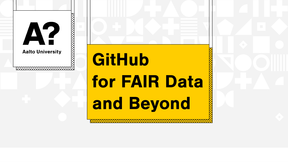GitHub for FAIR Data and Beyond, Oct 12, 2023

Description
FAIR is the first part of data management, but what comes next? To get the most value of our research data, our data should be alive, which means that the research community can contribute back with improvements. That means that we can accept contributions from others easily, and others can use and modify the data without making diverging copies. Thus, this talk proposes a “C” (for “collaborative contributions”) beyond the normal FAIR acronym.
After some thought, in our view the best solution to achieving the above is GitHub, which has a tagline of “Social Coding”. What if it wasn’t limited to “coding”?
While GitHub is normally used for software or computational work, it has the potential to solve other needs of RDM: version history, attribution for each change, and, most importantly, a way for anyone to make and comment on change proposals without needing to ask for special permission first (and use their own versions, without making it impossible to merge versions again later on). Could GitHub be used also in non-computational research, in order to improve the FAIRness of academic projects in general?
This event will
- Introduce the background to the above and why GitHub could be appropriate for different kinds of non-code academic projects
- Introduce an example of using GitHub for a non-code academic project
- See how GitHub can allow an outside person to easily contribute to a non-code project
- Discuss how and what barriers there would be to adopting GitHub more broadly (e.g. is there a user interface that is simple and usable enough for broad use?)
- Include discussion and future planning (e.g. does anyone want to begin setting something up?)
Who can participate?
The webinar is aimed at university staff and students who are interested in the topic. No prior knowledge of RDM is required. Some information covered in the session, such as details of Aalto’s RDM services, is relevant only to those working at Aalto. The webinar is free of charge.
Format
A one-hour webinar including a Q&A discussion.
Schedule and location
The training will be held online via Zoom on October 12, at 2–3 PM Eastern European Time (EET).
Instructor(s)
Dr. Richard Darst, Staff Scientist, Data Agent, School of Science, Aalto University
& the Aalto Scientific Computing team (Aalto SciComp)
Aalto RDM & Open Science Training | YouTube | Privacy Notice
- Published:
- Updated: